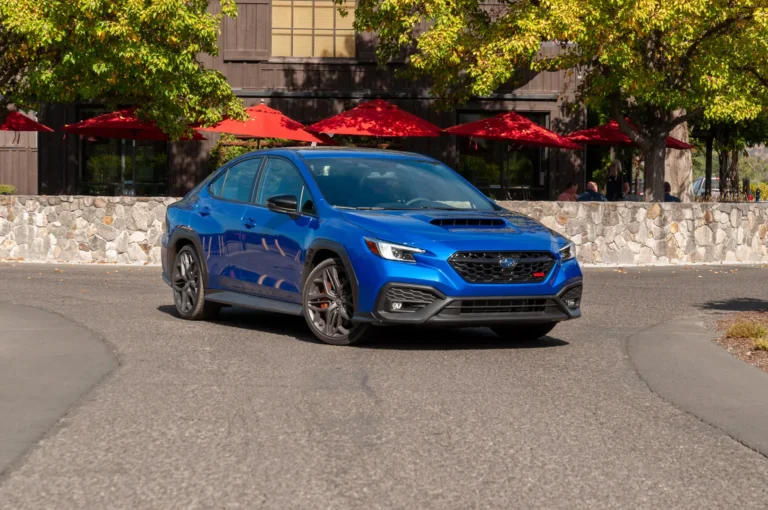-
The 2025 Subaru WRX tS replaces the TR in the lineup
-
Subaru’s STI team gave the tS electronically adjustable steering and dampers
-
The 2025 Subaru WRX tS will cost about $43,000 when it arrives early next year
If you were disappointed with the WRX TR, Subaru wants redemption. It gets it for 2025 in the form of the 2025 Subaru WRX tS.
Finally, Subaru has let the STI team get their hands on the latest WRX. The resulting WRX tS upgrades the suspension and addresses steering quibbles with the TR.
Still, it stops short of what a new STI could, or even should, be.
Subaru tossed me the keys to a WR Blue Pearl 2025 WRX tS to hammer around Sonoma Raceway and local surrounding streets to determine how it handled, and how they’d addressed the WRX TR’s shortcomings.
2025 Subaru WRX tS
WRX tS: Tuned by STI
The STI crew in Japan must have been bored, or must have begged the right person, because they were finally allowed to wrench on the latest WRX. The tS stands for Tuned by STI—but doesn’t wear the STI badge. A few bits around the cabin have STI labels.
If you’ve already forgotten, the WRX STI died with the U.S. fourth-gen car (fifth-gen for the rest of the world, we were late to the party) due to emissions and regulations. It’s not coming back.
The STI team grabbed the electronically adjustable dampers from the automatic-only WRX GT and retuned them for tS duty with a focus on road and track use. The result are dampers that in Normal mode are tuned like those in the TR but stiffen in Sport mode to reduce roll by 30% and pitch by 55%, according to Subaru. Comfort mode swings the other way and gets softer and more compliant than in the TR to help make the WRX’s stiff chassis more comfortable over broken pavement.
The steering system that senior editor Kirk Bell found too light in the WRX TR has been swapped for a driver selectable system. STI tuned Comfort mode for a TR-like feel—light— while Normal and Sport add heft to the steering.
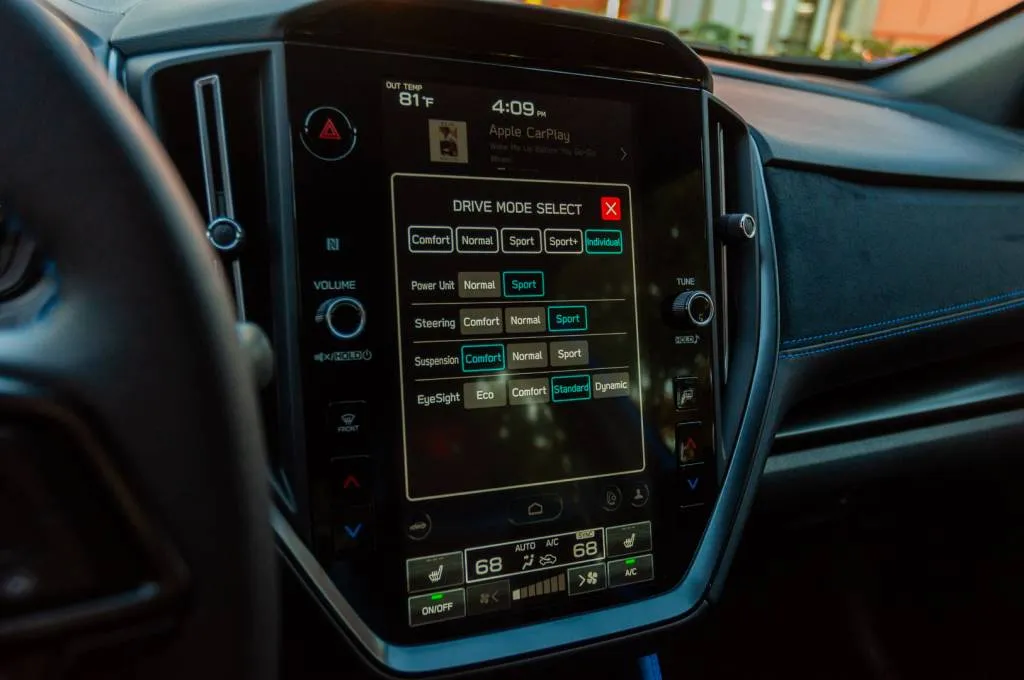
2025 Subaru WRX tS
WRX tS gets adaptive and adjustable
I took a right out of the hotel parking lot, and it took only a handful of miles to feel the difference the new adjustable dampers make in the WRX tS. Toggling the Mode button on the steering wheel from Comfort to Normal and then finally to Sport+ progressively, and noticeably, stiffens the dampers. I skipped Sport mode here because it doesn’t change the dampers, which remain in Normal setting in that mode.
Cruising through a construction zone on asphalt that had been milled but not yet repaved, Comfort mode soaked up the grooved surface while Sport+ bordered on too stiff. I toggled back to Comfort because inside I’m quickly turning into an old man. But make no mistake, even in Comfort mode this is no WRX GT, it’s just not jarring.
The Mode changes also dialed up the steering weight, but Sport+ never approaches the “why is this so heavy” limit found in some of South Korea’s latest metal like the Genesis G70.
The drive to Sonoma Raceway is brief, but enough to realize the breath of tuning by the STI team from the adjustable dampers is vast. It painted a rosy picture for those looking to both daily drive yet also track and or blast around backgrounds on the weekend in the WRX tS.
As I headed onto Sonoma Raceway in the WRX tS I toggled back into Normal mode to get a baseline for the suspension and steering systems. Linking the first few turns together it was clear Normal mode’s steering felt light with quicker-than-intended movements, but nothing that felt uncomfortable. Normal mode’s suspension tuning kept the car in check and didn’t feel too soft, but the car didn’t rotate as easily as desired as it rolled through the corners. I wanted to kick its rear end out, but the Bridgestone Potenza S007 245/35 R19S (the same tires found on the TR) attempted to stick through the carousel and onto the straight heading to turn 7 where I hit 101 mph before hitting the strong Brembo brakes.
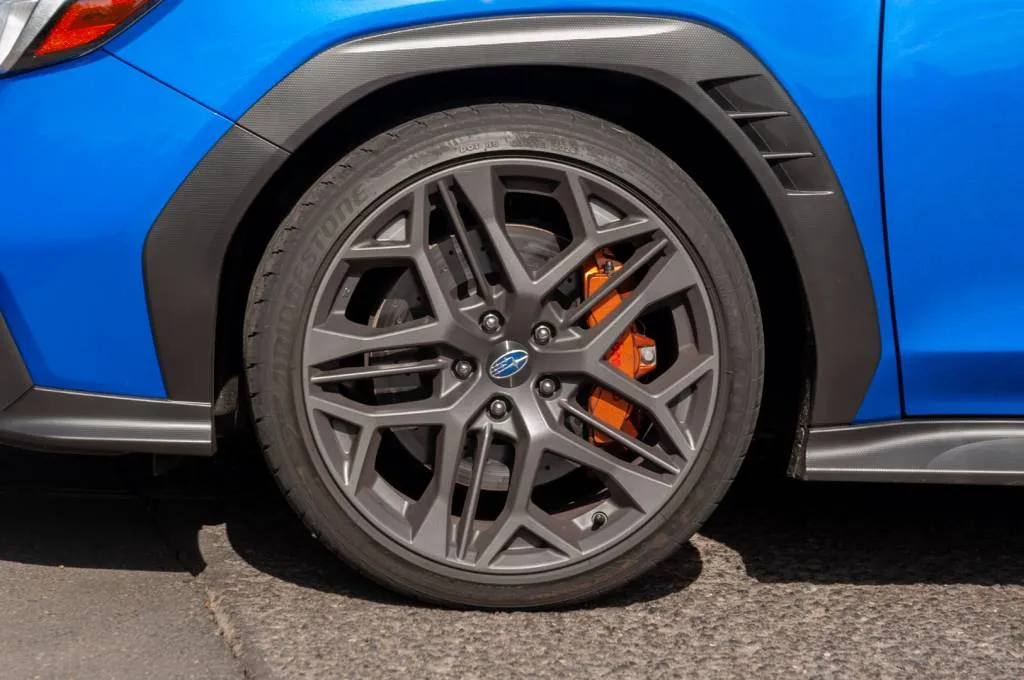
2025 Subaru WRX tS
Those Brembos are the same found on the TR with 13.4-inch cross-drilled front rotors grabbed by Brembo 6-piston calipers paired with cross-drilled 12.8-inch rear rotors and 2-piston calipers in the rear Despite multiple lap sessions by multiple journalists over the course of two days the brakes never seemed to fade or show signs of weakness. The pedal’s progressive and bite is strong, instilling confidence at 101 mph heading into a turn.
Successive laps revealed Sport+ mode was my ideal choice for the track. Tip-in with the accelerator pedal was a little quicker, the heavier steering made my steering inputs smoother, and the stiffer damper setting seemed to make it easier to kick the rear end out and slide down the turn 6 carousel heading into the straight. =
For a brief moment heading past the pits and into turn 1 and 2 I clicked the mode button on the steering wheel to Comfort. Just to see. I had to know. That was a mistake. The steering went light and felt loose. Instantly I knew why Bell hated the TR’s steering. I clicked out of Comfort and back into Sport+ to stiffen up the steering and dampers for one more lap.
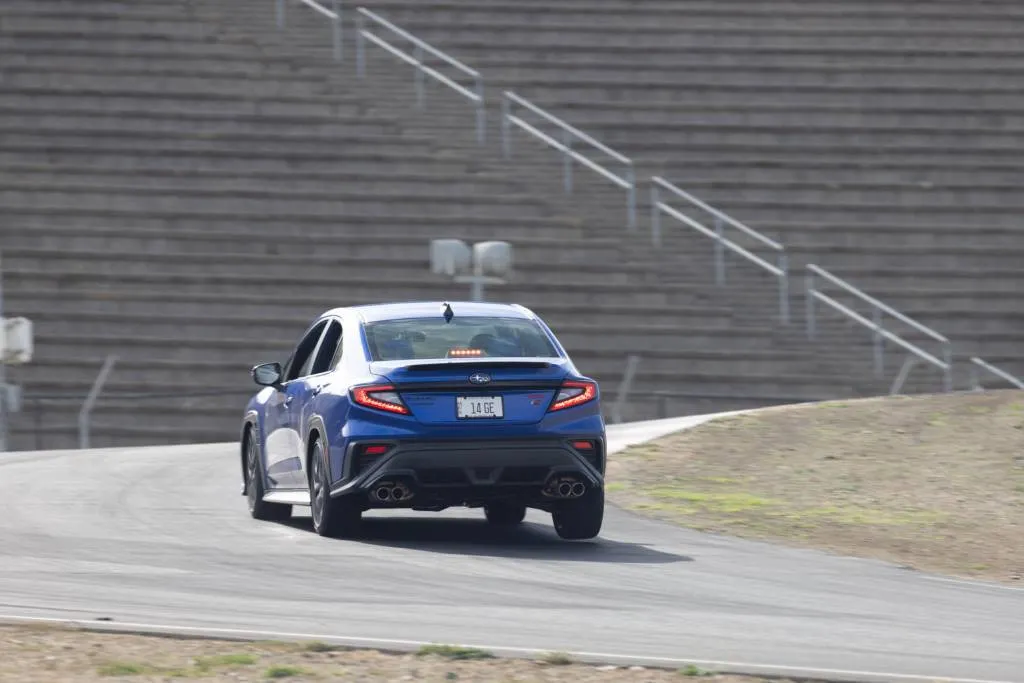
2025 Subaru WRX tS
With the WRX’s all-wheel-drive system splitting the power 50:50, the car, at times, attempted to pull and push through the corner while trying not to plow the front end. I could feel the front tires trying to rotate the car. Anyone hoping the STI team gave the tS an electronically variable center differential will be disappointed. There’s no ability to change the torque split here.
While the adjustable steering fixes the weight issue, no one’s going to rave about steering feel. There isn’t a ton to speak of and no one will be confusing this steering with that in a Porsche.
To my surprise, the Bridgestone Potenza S007 tires were predictable and gave plenty of warning as the limit was nearing. I’m not usually a fan of Bridgestone summer tires as I’ve found them, in general, to provide little warning as the limit’s reached and then found. That wasn’t the case here.
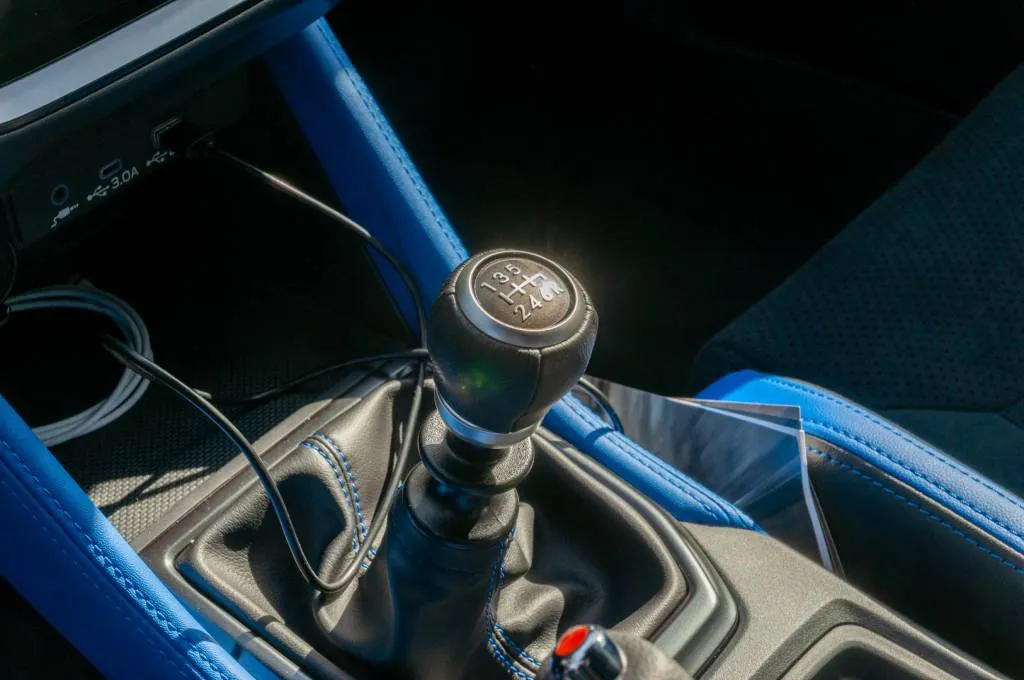
2025 Subaru WRX tS
The 6-speed manual is the only transmission offered–enthusiasts rejoice–and is a well-known unit. No changes have been made. That means longer throws than a Honda Civic Si or Type R and a notchy gearbox. Beggars can’t be choosers in this automatic-only era, but the Subaru unit simply doesn’t snick smoothly from gear to gear in the same manner as Honda’s manual.
On the street on winding, twisting, backroads around Sonoma I found broken pavement. What happened to California’s pristine roads? The programmable Individual drive mode came into play here with the ideal setup proving to be Comfort suspension paired with Sport steering and Sport throttle response. The Sport mode for the dampers made things skittish and unsettled. The dampers never approached Hyundai Veloster N shake-your-kidneys status, but stability was less than ideal at the speeds I may or may not have been going.
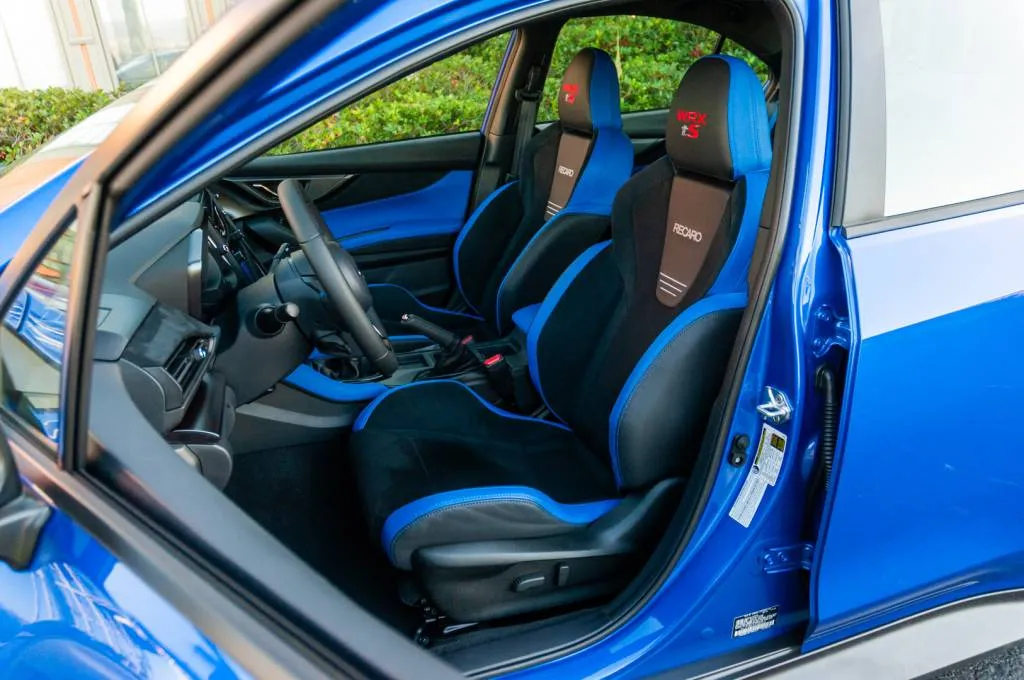
2025 Subaru WRX tS
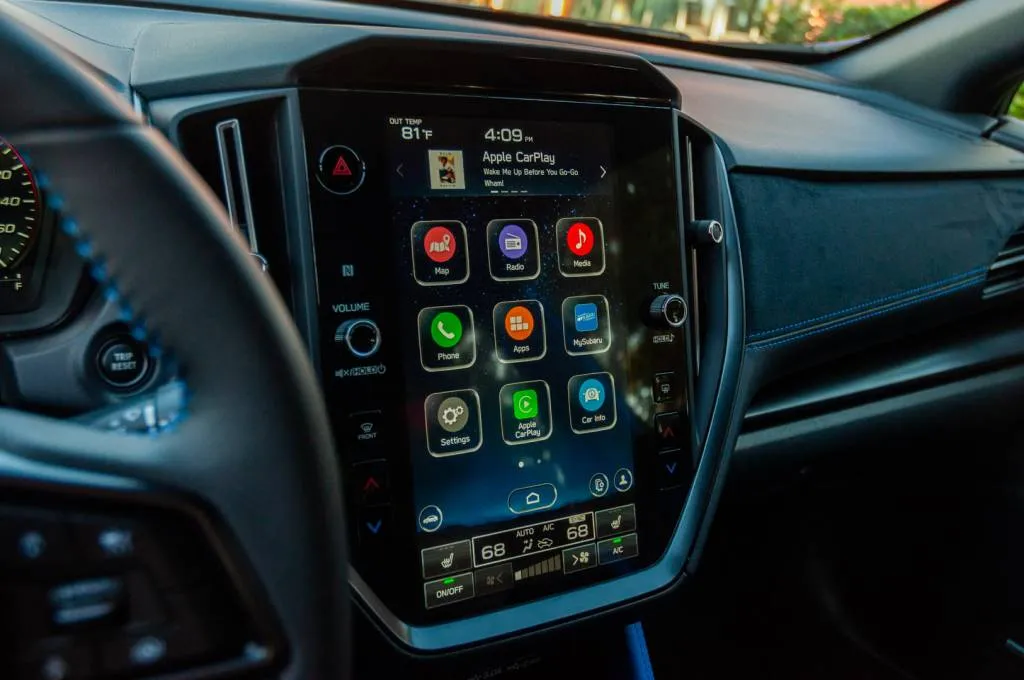
2025 Subaru WRX tS
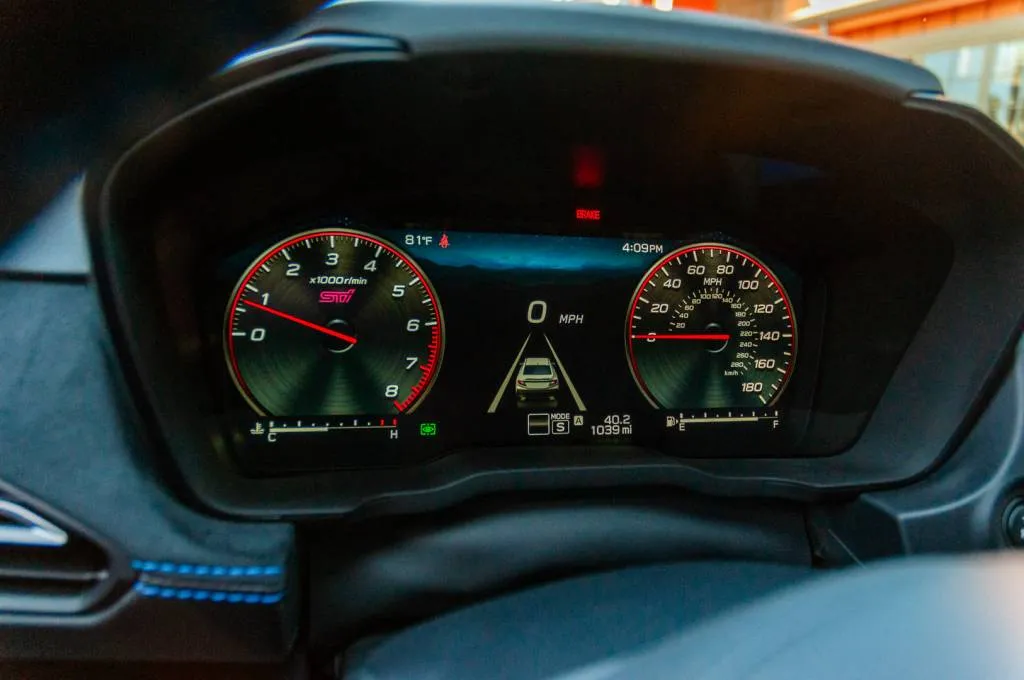
2025 Subaru WRX tS
WRX goes digital
For 2025 the tS introduces a digital gauge cluster to the WRX. Admittedly, I hated it in photos when Subaru announced the tS, but in person it’s pleasing to the eyes. The gauges, while by no means have true depth to them, are razor sharp in the display and the red needles feel as if they should be in an STI.
There’s also a reminder in that 12.3-inch digital gauge cluster of who’s been here, as there’s an STI badge in the lower left corner. It compliments the red start button with white STI lettering.
It’s been a minute since I slid behind the wheel of a WRX–the year was 2022, to be exact–but Subaru’s improved the interface on the 11.6-inch touchscreen significantly. The heated seat controls are now always on the touchscreen rather than buried two taps deep into the menus. This is, after all, a Subaru. The interface is simple to use with hilariously oversized iPad-like icons and wireless Apple CarPlay worked flawlessly.
The rest of the interior is standard WRX fare aside from the fantastic standard black Recaro sport buckets up front with blue trim. Every WRX tS’s Recaros will feature that blue trim, whether the exterior is white, red, or blue. Choose your color accordingly. The driver side is 8-way power while the passenger seat is manually operated. They grabbed my admittedly now narrower 5-foot-10 frame in all the right places and kept me firmly planted while hauling around the track. Others that were a little wider noted they pinched their side. Your mileage, and comfort, may vary.
Thankfully, like the TR, there’s no sunroof in the tS. This helps with headroom, but also keeps weight down.
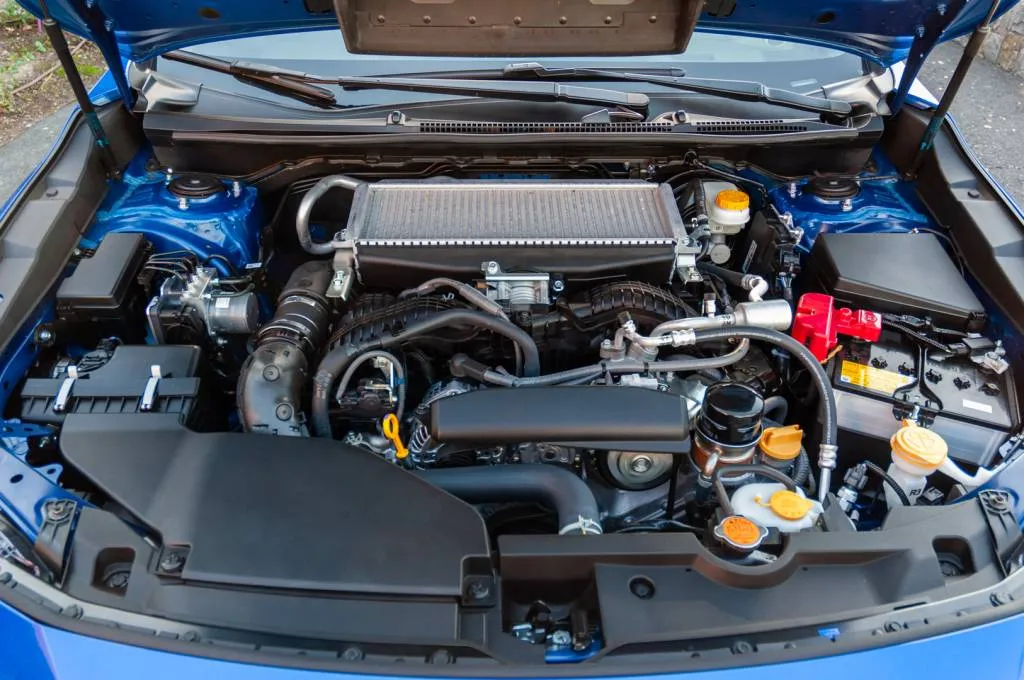
2025 Subaru WRX tS
WRX tS isn’t going to be cheap
The WRX’s standard 2.4-liter turbo-4 is rated at 271 hp and 258 lb-ft of torque. That translates to a 0-60 mph time of 5.5 seconds, which is quick, but not STI fast. The outgoing STI had 315 hp and dropped that 0-60 mph time by about a second. The tS simply doesn’t have STI power.
And that’s the issue.
Subaru hasn’t released prices, but said when the 2025 WRX tS arrives early next year it’ll cost about the same or just under the top-spec GT model. The WRX GT costs $45,335 including a $1,120 destination charge. The TR rang in just under that at $42,775.
The pricing places the 2025 WRX tS solidly in Honda Civic Type R and Toyota GR Corolla territory, but with less power than both. The WRX’s argument is that it has all-wheel drive standard for all-weather capability the Type R can’t match, and a nicer interior (including an arm rest up front) than the GR Corolla.
For buyers that were ready to spend the money on the WRX TR but simply didn’t like its steering, or wished it had the GT’s adjustable suspension, the tS makes sense. For those wishing Subaru would let the STI team monkey with the WRX again, the tS really makes sense. But for anyone hoping to get a full STI, the tS is just a taste, and not the full pie.
Subaru paid for travel and lodging along with some delicious bacon for me to bring you this first-hand review of the 2025 WRX tS.


